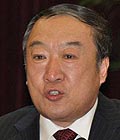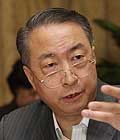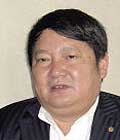|
Urbanization Swings Into Gear

Su Rong, deputy to the 11th NPC and Secretary of Jiangxi Provincial Committee of the Communist Party of China
As China picks up the pace of urbanization, an inevitable question arises: how can it properly help farmers integrate into urban lives? Many young migrant workers born in the 1980s and 1990s are unfamiliar with farming and wish to move to cities.
Obviously, smaller towns on the outskirts of urban areas, as opposed to the crowded cities themselves, will absorb most of the rural residents. But this requires removal of many social system barriers, including the established household registration system, to grant farmers equal rights with urban residents, as well as education, healthcare and pension benefits. A better social safety net would also add an extra incentive for farmers to increase spending and buoy the consumer market.
Of course, efforts must also be made to improve infrastructure and public services in small towns, and help create more jobs for rural migrants. The government is expected to step up fiscal investments and financial support needed to accelerate development in small towns.
Educational Reform

Zhang Xinsheng, member of the 11th CPPCC National Committee and Vice Minister of Education
Chinese government departments, including the Ministry of Education, are concerned about educational reform: how to cultivate students with various abilities instead of their just getting good marks in exams?
We are now in a test run of curriculum reform. We think it is not proper to divide student in high schools into two groups--one focusing on studying history, politics and literature and another on the study of chemistry, physics and mathematics. It is definitely not good for the development of the students. Modern society demands talented people with comprehensive development, including literature and natural sciences.
Now our education focuses more on intellectual education and doesn't pay enough attention to moral and physical education. This is not a healthy educational system.
Some people blame employment problems facing college students on enlarged enrollment in universities. I don't think this is correct. After China began the opening-up and reform policy more than 30 years ago, for a long time the number of college graduates couldn't meet the demand of social development, so a higher enrollment in some way solved the problem.
Our country's development needs technology and talent. Governments at all levels, public enterprises, and private firms must all work together.
Rural Pension Insurance

Xie Deti, member of the 11th CPPCC National Committee and a professor of Southwest University based in Chongqing Municipality
Rural pension insurance reform is another important reform after taxation reform in rural areas. Including rural residents in the insurance system is part of the demand in providing an insurance system for the whole of society and also demanded by overall development of rural and urban areas.
Pension insurance in rural areas has long been a difficult problem and of great importance for their development. Since the 1980s, the government has gradually set up a social insurance system. A rural pension insurance project was started in 1992 but didn't make any obvious achievements.
| 